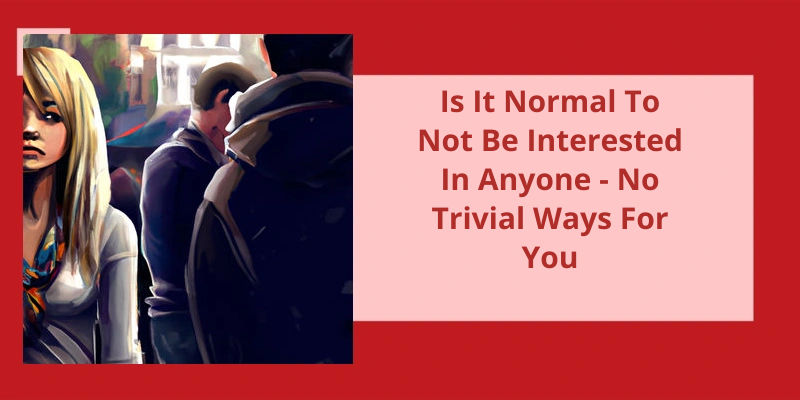Is it normal to not be interested in anyone? This is a question that many people ask themselves at some point in their lives. Whether you’re going through a period of introspection or simply questioning your own emotions, it’s important to understand that everyone's experiences and desires are unique. In a society that often prioritizes romantic relationships, it can be easy to feel abnormal or out of place if you don't feel a strong attraction towards anyone. However, it’s important to remember that there’s no "normal" when it comes to matters of the heart. Some individuals may simply be more introspective or focused on personal growth, while others may not have found someone who sparks their interest yet. It’s crucial to embrace your own journey and not compare yourself to societal expectations. There’s no right or wrong way to feel, and it’s essential to honor your own emotions and desires, even if they deviate from the norm. There are no trivial ways to navigate your own heart, and it’s a journey that only you can undertake. Focus on self-discovery, personal growth, and staying open to the possibilities that life may bring. The most important thing is to be true to yourself and embrace whatever path your heart chooses to take.
Is It Normal to Not Want Social Interaction?
Social interaction is a fundamental aspect of human behavior, and for many people, it’s a source of enjoyment and fulfillment. However, it’s also perfectly normal to not want social interaction from time to time. Each individual has their own unique preferences and needs when it comes to socializing, and it’s important to respect those boundaries.
There can be various reasons why someone may not be interested in social interaction. It could simply be a matter of personal preference, where they find solitude and introspection more gratifying than engaging with others. It could also stem from introversion, where individuals may feel drained by excessive social interaction and prefer to recharge in solitude.
While it’s normal to not want social interaction, it’s crucial to distinguish between choosing solitude as a personal preference and avoiding it due to shyness or anxiety. If the latter is the case, it’s advisable to confront and address these fears instead of letting them control your life. Overcoming shyness or anxiety around social interaction can be a gradual process, but it can significantly enhance your overall well-being and quality of life.
Whether it’s through therapy, self-help techniques, or gradually exposing yourself to social situations, facing these fears head-on can help you develop essential social skills and gain confidence in engaging with others. It may seem daunting initially, but with time and practice, you may find yourself becoming more comfortable and gradually more interested in social interaction.
It’s also important to remember that not everyone needs the same level of social interaction. Some individuals thrive in large social settings, while others find solace in cultivating deep connections with a select few. Honoring your own needs and preferences is crucial in finding a healthy balance between socializing and personal time.
Ultimately, what matters most is finding the right balance that aligns with your own personality and well-being. Whether it’s wanting to be alone or seeking social interactions, as long as you’re content and fulfilled, there’s no need to feel abnormal or pressured to conform to societal expectations. Embrace your own unique preferences and carve out a lifestyle that resonates with your inner self.
In everyday conversations, we often come across individuals who seem disinterested or unenthusiastic about various subjects or activities. These people may showcase traits such as aloofness, detachment, incuriosity, indifference, or lack of concern. It’s important to note that being disinterested doesn’t necessarily make someone indifferent; rather, it implies a neutral perspective without any bias or personal gain.
What Do You Call a Person Who Is Not Interested in Anything?
Is It Normal to Not Be Interested in Anyone – No Trivial Ways for You
It isn’t uncommon for a person to go through phases in life where they may not feel interested in anyone or anything. Some individuals may simply be experiencing a temporary disinterest, while others may identify as having a more persistent disinterest. People who fall under this category may be referred to as aloof, detached, incurious, indifferent, or unconcerned. However, the term “disinterested” is particularly relevant when describing individuals who possess a unique ability to judge or advise without bias due to their circumstantial freedom from concern for personal or financial gain.
It’s crucial to acknowledge that not being interested in anyone or anything can vary greatly from person to person. Some individuals may temporarily lose interest due to external factors such as stress, a busy lifestyle, or personal issues. This disinterest may be a temporary state and shouldn’t be a cause for concern. However, for others, a persistent lack of interest could be indicative of a deeper issue or personal trait.
For those who identify as disinterested, it’s important to recognize that this is a valid and individual experience. Society often places a significant emphasis on being interested in others or forming connections. However, it’s essential to remember that each person has their own unique preferences and ways of engaging with the world. Ones disinterest in others may not necessarily be a negative trait, but rather a reflection of their own individuality and personal preferences.
It’s crucial to avoid labeling individuals who’re disinterested as “abnormal” or “unusual.”. People have diverse personalities, and some individuals naturally possess a more introverted or introspective nature. The absence of interest in others doesn’t necessarily indicate a lack of empathy or inability to form relationships. It may simply mean that an individual finds greater satisfaction and connection within themselves or with a smaller, select group of individuals.
Ultimately, it’s essential to respect and accept individuals who don’t show interest in others. It’s a personal choice, and as long as it doesn’t impede on their overall well-being or relationships, it shouldn’t be seen as a cause for concern. Instead of focusing on labeling individuals or attempting to change their disinterest, it may be more productive to understand and appreciate their unique perspectives and ways of engaging with the world.
Source: Synonyms of disinterested – Merriam-Webster
As we age, it isn’t uncommon for our interests and preferences to evolve. While this natural progression may lead to a decrease in enthusiasm for certain hobbies, some individuals may experience a broader decline in their overall ability to find pleasure in activities that once brought them joy. This phenomenon, known as anhedonia, can have various underlying causes and may warrant further exploration.
Is It Normal to Lose Interest in Hobbies as You Get Older?
Is it normal to lose interest in hobbies as you get older? Many of us have had the experience of losing interest in some of the activities that used to excite us. As we grow older, our priorities change, and our time becomes more limited. It isn’t uncommon for hobbies that once brought us joy to gradually fade into the background. Life becomes increasingly busy with work, family responsibilities, and other obligations, leaving less time for personal pursuits.
Additionally, as we age, our tastes and preferences may evolve. What once captivated our interest may no longer resonate with us in the same way. We may find that our values and interests change, leading us to seek out new hobbies or activities that align better with our current selves.
However, it’s important to distinguish between this normal evolution of interests and a more concerning phenomenon. Some individuals may experience a general decrease in their ability to experience pleasure in activities they used to find enjoyable, a condition known as anhedonia. Anhedonia can be a symptom of underlying mental health issues, such as depression or certain medical conditions. It’s essential to pay attention to persistent changes in interest and pleasure, as they may warrant professional evaluation and support.
In general, it’s perfectly normal for our hobbies and interests to evolve or change as we get older. Life is a journey of growth and self-discovery, and our passions are bound to fluctuate along the way. It’s important to embrace these changes and explore new avenues that spark joy and fulfillment in our lives. Whether it’s picking up a new hobby, revisiting old ones with a fresh perspective, or seeking out entirely different activities, the key is to remain open-minded and adaptable to our evolving interests.
Conclusion
In conclusion, it isn’t uncommon for individuals to experience periods of disinterest or lack of attraction towards others. While societal norms may suggest that a constant pursuit of romantic relationships is normal, it’s essential to recognize that everyone's experiences and desires are unique. It’s important to avoid trivializing or pressuring oneself into conformity, as genuine connections and feelings can’t be forced. It’s vital to embrace and understand oneself, prioritizing personal growth and self-acceptance. Whether one is temporarily uninterested in pursuing romantic relationships or simply hasn’t found the right person yet, it’s crucial to honor and respect one's own feelings and preferences. Ultimately, the path to happiness and fulfillment lies in finding contentment within oneself, rather than conforming to external expectations.






